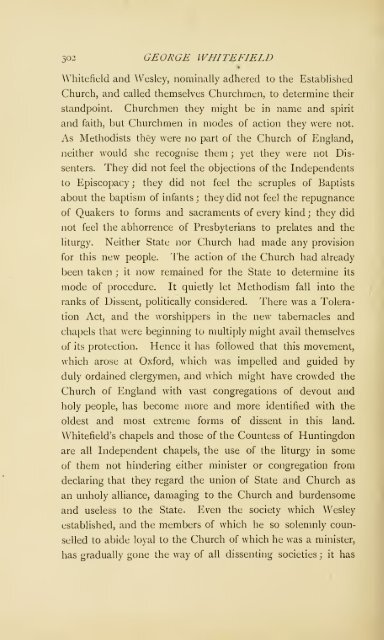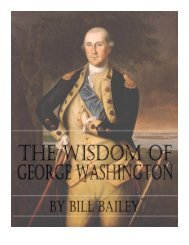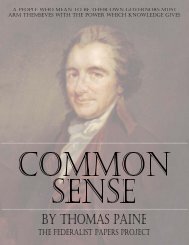- Page 2 and 3:
t6d£levc-rtn/l
- Page 4 and 5:
PREFACE favourable THE reception wh
- Page 6 and 7:
PREFACE vii for the settled pastor
- Page 8:
PREFACE ix some of them Christians
- Page 11 and 12:
xii CONTENTS CHATTER VI. May to Aug
- Page 13 and 14:
2 GEORGE WHITEFIELD for their sakes
- Page 15 and 16:
4 GEORGE WHITEFIELD retired to his
- Page 17 and 18:
6 GEORGE WHITEFIELD Adverse circums
- Page 19 and 20:
8 GEORGE WHITEFIELD and a bed upon
- Page 21 and 22:
io GEORGE WHI'IEFIELD impression wa
- Page 23 and 24:
12 GEORGE WHITEFIELD The first Meth
- Page 25 and 26:
14 GEORGE WHITEFIELD his resolution
- Page 27 and 28:
1 GEORGE WHITEFIELD had soon to sha
- Page 29 and 30:
i8 GEORGE WHITEFIELD within me, tha
- Page 31 and 32:
20 GEORGE WHITEFIELD teacher, as wa
- Page 33 and 34:
22 GEORGE WHITEFIELD engaged in whe
- Page 35 and 36:
24 GEORGE WHITEFIELD changes which
- Page 37 and 38:
26 GEORGE WHITEFIELD being puffed u
- Page 39 and 40:
28 GEORGE WHITEFIELD case on behalf
- Page 41 and 42:
30 GEORGE WHITEFIELD writer's praye
- Page 43 and 44:
32 GEORGE WHITEEIELD sees him porin
- Page 45 and 46:
34 GEORGE WHITEFIELD unequal to a s
- Page 47 and 48:
36 GEORGE WHITEFIELD rustics became
- Page 49 and 50:
33 . GEORGE WHITEFIELD of his inten
- Page 51 and 52:
CHAPTER III March, 1737—March, 17
- Page 53 and 54:
42 GEORGE WH1TEF1ELD particular not
- Page 55 and 56:
44 GEOkGE WHITEFlELD streets in the
- Page 57 and 58:
46 GEORGE WHITEElELD it could not b
- Page 59 and 60:
48 GEORGE WHITEFIELD not in the pen
- Page 61 and 62:
50 GEORGE WHITEF1ELD with their lan
- Page 63 and 64:
52 GEORGE WHITEF1ELD him, and he as
- Page 65 and 66:
54 GEORGE WHITEFIELD London. You le
- Page 67 and 68:
56 GEORGE WH1TEFIELD added, the Chu
- Page 69 and 70:
58 GEORGE WHITEFIELD Whitefield's f
- Page 71 and 72:
6o GEORGE WHITEFIELD ' civility ' s
- Page 73 and 74:
62 GEORGE WHITEFIELD contribute tow
- Page 75 and 76:
64 GEORGE WHITEFIELD he could get a
- Page 77 and 78:
66 GEORGE WHITEFIELD or thrice in o
- Page 79 and 80:
CHAPTER V December, 1738—April, 1
- Page 81 and 82:
70 GEORGE WHITEFIELD wonder he felt
- Page 83 and 84:
72 GEORGE J IV//TEE/ELD upon his re
- Page 85 and 86:
GEORGE WHITEFIELD chancellor Whitef
- Page 87 and 88:
76 GEORGE WHTTEFIELD accused Whitef
- Page 89 and 90:
78 GEORGE WHITEFIELD a placid compo
- Page 91 and 92:
So GEORGE WHITEFIELD manner as he h
- Page 93 and 94:
82 GEORGE WHITEFIELD preached agree
- Page 95 and 96:
84 GEORGE WHITEFIELD The time when
- Page 97 and 98:
86 GEORGE WHITEFIELD city. At seven
- Page 99 and 100:
88 GEORGE WH1TEF1ELD there. ' Yes,
- Page 101 and 102:
go GEORGE WHITEFIELD well satisfied
- Page 103 and 104:
92 GEORGE U'/IITEFIELD power may.be
- Page 105 and 106:
94 GEORGE WHITEFIELD so, most likel
- Page 107 and 108:
96 GEORGE WHITEFIELD First, that he
- Page 109 and 110:
9 8 GEORGE WH1TEF1ELD wrote to say
- Page 111 and 112:
ioo GEORGE WHITEFIELD thousand, but
- Page 113 and 114:
o2 GEORGE WHITEFIELD wanting, and w
- Page 115 and 116:
104 GEORGE WHITE FIELD peace. White
- Page 117 and 118:
io6 GEORGE WHITEFIELD vanities, let
- Page 119 and 120:
10S GEORGE WHITEFIELD The first sha
- Page 121 and 122:
no GEORGE WHITEFIELD is the enthusi
- Page 123 and 124:
CHAPTER VII August, 1739—March, 1
- Page 125 and 126:
lt H4 GEORGE WHITEFIELD none of the
- Page 127 and 128:
1 1 GEORGE J VH1 TEFIELD must have
- Page 129 and 130:
nS GEORGE WHITEFIELD women a month
- Page 131 and 132:
1 26 GEORGE WHITEFIELD handful of c
- Page 133 and 134:
, woods, I they ( places j minister
- Page 135 and 136:
124 GEORGE WH1TEFIELD emptoriness,
- Page 137 and 138:
el 126 GEOAGE WHITEFIELD he answere
- Page 139 and 140:
128 GEORGE WHITEFIELD ever you get
- Page 141 and 142:
i3o GEORGE WHTTEFIELD and they had
- Page 143 and 144:
1 32 GEORGE WHITEF1ELD to labour al
- Page 145 and 146:
(l 134 GEORGE WHITEFIELD in a lette
- Page 147 and 148:
136 GEORGE WHITEFIELD and forming a
- Page 149 and 150:
138 GEORGE WHITEFIELD came and prea
- Page 151 and 152:
Mo GEORGE WHITEFIELD sistent with t
- Page 153 and 154:
142 GEORGE WHITEFIELD Oh, what stro
- Page 155 and 156:
144 GEORGE WHITEFIELD His return to
- Page 157 and 158:
i that I p GEORGE WHITEFIELD The fa
- Page 159 and 160:
i 4 8 GEORGE WHITEFIELD him from th
- Page 161 and 162:
I' i5o GEORGE WHITEFIELD so is the
- Page 163 and 164:
52 GEORGE WHITEFIELD their large di
- Page 165 and 166:
154 GEORGE WHITEFIELD self that he
- Page 167 and 168:
156 GEORGE WHITEEIELD cautions abou
- Page 169 and 170:
158 GEORGE WHITEFIELD with him, was
- Page 171 and 172:
160 GEORGE WHITEFIELD exhausting la
- Page 173 and 174:
1 62 GEORGE WHITE'FIELD The letter
- Page 175 and 176:
[64 GEORGE WHITEFIELD the right han
- Page 177 and 178:
CHAPTER VIII March, 1741—August,
- Page 179 and 180:
1 68 GEORGE WHITEFIELD London. The
- Page 181 and 182:
170 GEORGE WHITEF1ELD the kirk, les
- Page 183 and 184:
172 GEORGE WHITEFIELD forward, ther
- Page 185 and 186:
174 GEORGE WHITEFIELD merit, though
- Page 187 and 188:
176 GEORGE WHITEFIELD sir,' Whitefi
- Page 189 and 190:
178 GEORGE WHITEFIELD is colleague
- Page 191 and 192:
180 GEORGE WHITEFIELD to be depende
- Page 193 and 194:
1 82 GEORGE WHITEFIELD mine to vent
- Page 195 and 196:
1 84 GEORGE WHITEFIELD ' London, Ma
- Page 197 and 198:
1 86 GEORGE WHITEFIELD George White
- Page 199 and 200:
1 88 GEORGE WHITEFIELD parish, pray
- Page 201 and 202:
19° GEORGE WHITEFIELD fresh triump
- Page 203 and 204:
k;2 GEORGE WH1TEFIELD blind rage of
- Page 205 and 206:
] 9 4 GEORGE WHITEEIELD practised b
- Page 207 and 208:
1 96 GEORGE WHITEFIELD Published ag
- Page 209 and 210:
198 GEORGE WHITEFIELD not all left
- Page 211 and 212:
2oo GEORGE WHITEFIELD October he to
- Page 213 and 214:
202 GEORGE WHITEFIELD the corrupt s
- Page 215 and 216:
204 GEORGE WHITEFIELD Common ; and
- Page 217 and 218:
^06 GEORGE WHITEFIELD in the holida
- Page 219 and 220:
2o8 GEORGE WHITEFIELD suppression o
- Page 221 and 222:
210 GEORGE WHITEFIELD home rejoicin
- Page 224 and 225:
DEATH OF HIS SON 211 knowing what h
- Page 226 and 227:
THE DISSENTERS 213 while, amid much
- Page 228 and 229:
DR. DODDRIDGE'S FRIENDLINESS 215 Do
- Page 230 and 231:
ASSAILED BY THE BISHOPS 217 nection
- Page 232 and 233:
ASSAILED BY THE BISHOPS 219 State,
- Page 234 and 235:
SHAMEFULLY TREATED AT PLYMOUTH 221
- Page 236 and 237:
HENRY TANNER 223 him mad, they fill
- Page 238 and 239:
CHAPTER IX August, 1744— July, 17
- Page 240 and 241:
EXTRA ORDINA R Y CONVERSIONS 227 '
- Page 242 and 243:
THE SUFFERINGS OF CHRIST 229 he des
- Page 244 and 245:
A FALSE ALARM 231 Here we have, tho
- Page 246 and 247:
SERIOUS ILLNESSES 233 old Mr. Moody
- Page 248 and 249:
A SCOFFER CAUGHT 235 he was obliged
- Page 250 and 251:
THE CHURCH IN VIRGINIA 237 feast. A
- Page 252 and 253:
A FOREST CONGREGATION 239 Many a lo
- Page 254 and 255:
GROUNDS OF CHRISTIAN UNION 241 quot
- Page 256 and 257:
MISTAKES CONFESSED 243 were few dry
- Page 258 and 259:
CHAPTER X July, 1748-1752 APPOINTED
- Page 260 and 261:
DISTINGUISHED HEARERS 247 the most
- Page 262 and 263:
THE COUNTESS OF HUNTINGDON 249 rema
- Page 264 and 265: Huntingdon : The LORD BOLINGBROKE 2
- Page 266 and 267: 'MAKE A BISHOP OF HIM' 253 I really
- Page 268 and 269: DR. WATTS 255 were clamouring to ha
- Page 270 and 271: NOT A SECTARIAN 257 'Like a pure cr
- Page 272 and 273: BISHOP LA VING TON'S ATTACK 259 stu
- Page 274 and 275: A BROTHER'S LOVE 261 the infinitely
- Page 276 and 277: NOT ONE DRY MEETING 263 ' Yesterday
- Page 278 and 279: STONED BEFORE A BISHOP 265 to expre
- Page 280 and 281: THE VICAR OF HA WORTH 267 them. An
- Page 282 and 283: MRS. GRACE MURRAY 269 our hearts. I
- Page 284 and 285: INTIMATE WITH CONTEMPT 271 death to
- Page 286 and 287: EARTHQUAKES IN LONDON 273 was talki
- Page 288 and 289: ADVENTURES BY THE WAY 275 ladyship'
- Page 290 and 291: VISITING THE DYING 277 time he had
- Page 292 and 293: ILLNESS OF LADY HUNTINGDON 279 Two
- Page 294 and 295: SLA VER V IN GEORGIA 28 them, and h
- Page 296 and 297: IN IRELAND 283 Court. Her absence f
- Page 298 and 299: MISSING FACES 285 Sheffield he wrot
- Page 300 and 301: CHAPTER XI 1 753-i-770 CHAPEL-BUILD
- Page 302 and 303: ILLNESS OF WESLEY 289 His open-air
- Page 304 and 305: 17SITS LISBON 291 labourers spared
- Page 306 and 307: HIS WIFE'S LONELINESS 293 their bac
- Page 308 and 309: DEATH OF JOHN CENNICK 295 hymns whi
- Page 310 and 311: RIOTS AT LONG ACRE CHAPEL 297 were
- Page 312 and 313: CANONS AND CUEEDS 299 tradition. Ne
- Page 318 and 319: METHODISTS AND THE TOLERATION ACT 3
- Page 320 and 321: PRACTICALL V AN INDEPENDENT MINISTE
- Page 322 and 323: SHUTER THE COMEDIAN 307 ' Lord Jesu
- Page 324 and 325: STONED IN DUBLIN 309 story of the m
- Page 326 and 327: ACTORS When he visited Scotland in
- Page 328 and 329: DELIGHTS IN OPEN-AIR WORK 313 thund
- Page 330 and 331: A SSA ILED BY BISHOP WA RB UR TON 3
- Page 332 and 333: He proceeds : ( / BELIE VE IN THE H
- Page 334 and 335: DEA TH OF GRIMSHA W 319 I fear the
- Page 336 and 337: A SLEEPER AROUSED 321 fault were in
- Page 338 and 339: AN OLD MAN AT FIFTY 323 Work and si
- Page 340 and 341: RELIGIOUS LIBERTY AND EQUALITY 325
- Page 342 and 343: METHODISTS EXPELLED FROM OXFORD 327
- Page 344 and 345: DEATH OF HIS WIFE 329 first I addre
- Page 346 and 347: CHARACTERISTICS 331 in his vestry f
- Page 348 and 349: HIS PRINTED WORKS 333 done. Besides
- Page 350 and 351: THE LAST HYMN OF THE EVANGELISTS 33
- Page 352 and 353: B VENTIDB y3l ' O whut a new scene
- Page 354 and 355: THE LAST NIGHT 339 words of grace a
- Page 356 and 357: MS FUNERAL 341 fully of him. He tau
- Page 358 and 359: RESULTS OF HIS WORK 343 tongue. Fir
- Page 360 and 361: RESULTS OF HIS WORK 345 cuted Prote
- Page 362 and 363: RESULTS OF HIS WORK 347 Cambridge,
- Page 364 and 365:
RESULTS OF HIS WORK 349 1816, 2,927
- Page 366 and 367:
Aberdeen, 177-8 Acting, W.'s opinio
- Page 368 and 369:
Edinburgh, W.'s first arrival at, 1
- Page 370 and 371:
Kinsman, Rev. Andrew, 307, 347 Kirk
- Page 372 and 373:
Rhode Island, 149 Rogers, Rev. Mr.,
- Page 374:
effects of his preaching in America




